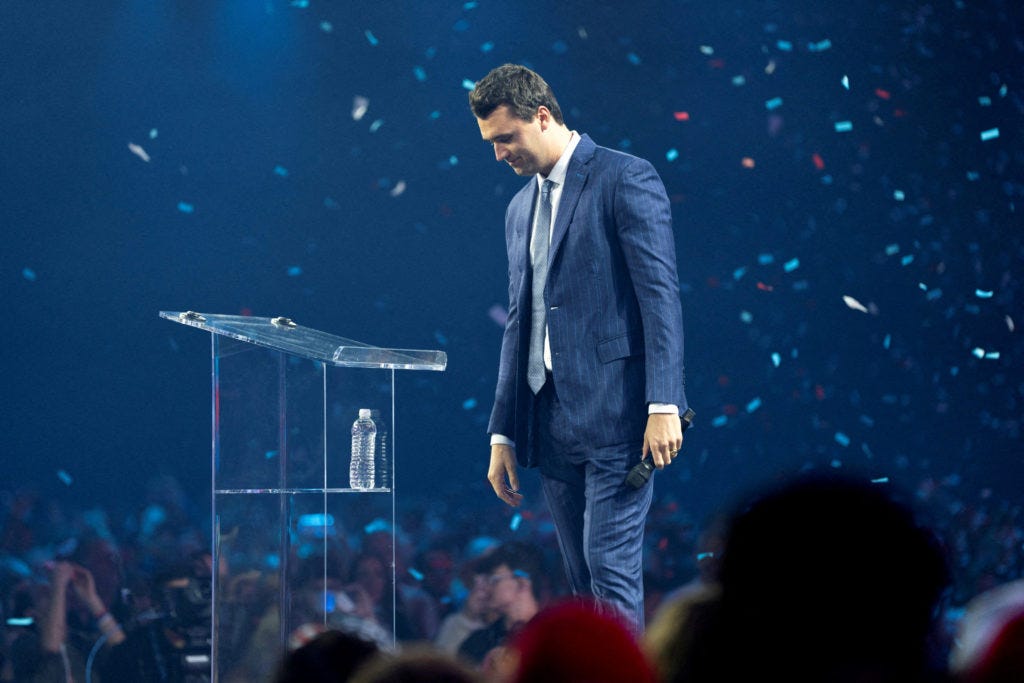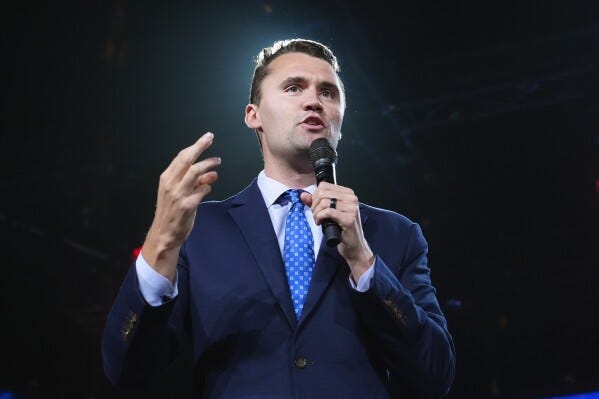Why Charlie Kirk's Death Feels Personal
The Evil He Called Out Has Shown Us Its Face
It feels personal. Not because we knew Charlie Kirk personally, but because he spent his public life diagnosing the very evil that stalks every one of us. He named cultural decay for what it was. He called out lies that most were too timid to confront. Sometimes his delivery was blunt, even abrasive. Sometimes it seemed he went one step too far. But more often than not, we were simply grateful someone else was doing it, as long as it was not us.
It feels personal because Charlie Kirk was gunned down for holding and speaking the very same beliefs that you and I hold right now: beliefs about faith, culture, and morality. His assassination strikes at the heart of every Christian, every conservative, every person who still clings to truth. He did not die for fame, or for vanity, or even for politics. He died for convictions that are not just his, but ours.
Some critics have tried to dismiss the visceral grief felt by conservatives by reducing it to what they call a “parasocial relationship” with Charlie. According to this view, people are reacting not because of what happened, but because they projected a kind of friendship onto a public figure they never met. This is not only shallow, it is false. The outrage and sorrow are not rooted in a one-sided attachment to a man on a screen. They are rooted in the fact that Charlie was killed for the very truths we ourselves profess. He was assassinated not because he was famous, but because he embodied convictions that millions of us hold. To trivialize that reality with psychological jargon is to avoid the obvious: this is personal because it is about all of us.
It feels personal because Charlie warned us this day would come. With prophetic clarity, he told us that when dialogue is replaced with slander, when persuasion gives way to caricature, when half the nation insists that conservatism is fascism, Nazism, or a reincarnated Hitlerism, then bullets will inevitably fly. He said it not as a doomsday prediction, but as a sober diagnosis of where cultural hysteria always ends: violence. And now the prophecy has come true.
And yet what makes this worse is the aftermath. The sheer number of people, literal thousands across social media, celebrating his murder, mocking his widow, or calling for the assassination of other conservative leaders, is not only grotesque, it is disgustingly revealing. It reveals that for many in the progressivist faction, there is no boundary between disagreement and destruction. There is no reluctance to cross the line from rhetoric to bloodshed. The mask of civility has slipped, and the hatred is bare.
That is why this feels personal. Because his death shows us what we are up against: a movement willing to justify violence against those who speak truth. A movement whose ideological rage has no restraint. We need to understand this: a movement that has spent decades decrying that human life has no inherent worth and value will have no qualms spilling human blood to make their point. The narrative? Disagree with us and be removed by force. This is not speculation; it is fact, proven by blood.
History is filled with moments when ideology turned to violence once reason was abandoned. The French Revolution spoke of liberty while guillotines ran day and night. Communism promised equality but delivered gulags and mass graves. Nazism promised national renewal but ended in the slaughter of millions. Progressivism, with its increasingly militant rejection of truth, is showing its face. And Charlie’s death is proof that we are past the stage of theory. We are in the stage of action.
It feels personal because many of us stood on the sidelines while he took the blows. Many were content to let him speak boldly while we whispered quietly. He stood on stages and said the things we muttered only to friends. He went on air and proclaimed the truths that too many in the pews left unsaid. He spoke the truth of Christ, boldly proclaiming that this culture of death is unsustainable, that moral relativism destroys, that sin enslaves, that Jesus is Lord. And now his blood testifies to the evil he warned us about.
This is why the assassination of Charlie Kirk feels so raw. It is not only the loss of a man. It is the tearing open of the veil. The evil he spent his career naming has manifested in blood. What he called out from stages and podcasts has come crashing into our reality with brutal force. And in that sense, his death is not only tragic. It is a summons.
The Book of Revelation speaks of a dragon enraged with the woman and her offspring, those “who keep the commandments of God and bear testimony to Jesus” (Revelation 12:17). That same enmity is alive today. Every faithful Christian, every defender of truth, is in the dragon’s sights. Charlie’s death reminds us that silence will not keep us safe. The evil that hates truth will not rest until all truth-tellers are silenced.
And so good people must rise up. Not with violence, but with courage. We must fill the spaces and the airwaves and the classrooms and the media and the print presses. We must take our place in every sector of society with the truth of Christ and the reason of natural law. The void left by Charlie’s assassination cannot remain empty. If we retreat, we cede ground to those who hate truth. We did this for decades and we are paying the price in the lives of the innocent. If we step forward, we continue the fight he lived for.
This is not the time for despair. It is the time for resolve. Evil has called us out. It has made its intentions plain. It has looked you and I square in the eyes and said: “You can do nothing.” The gauntlet has been thrown down. And now, Christ calls us to answer with the courage of faith, the clarity of truth, and the love of souls that refuses to surrender. Not equal violence, but relentless boldness in truth and love of Christ.
Charlie himself once said that if he were to die, he did not want to be remembered for the controversies, the headlines, or the arguments. He wanted to be remembered for his courage in faith. As a man who loved Christ, who loved his family, and who gave his life to defend truth in the public square. That was his measure of success. That was his legacy. And now, in his death, it is exactly how he will be remembered.
It feels personal because it is personal. The evil that hates Christ has struck at one of our own. And now we must decide: will we cower, or will we stand? Will we hide in fear, or will we proclaim Christ crucified and risen, the only hope for this broken world?
Charlie Kirk’s death feels personal because it is. And because it is, it must become a turning point. We cannot stay on the sidelines. We cannot stay silent. For as St. Paul wrote, “Now is the acceptable time; now is the day of salvation” (2 Corinthians 6:2)







Thank you Marcus. Time to carry that banner forward regardless of the cost. God bless you and your beautiful family.